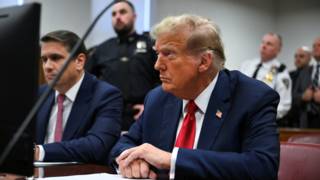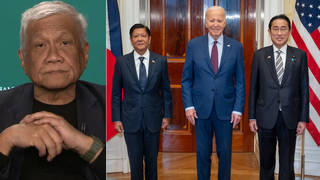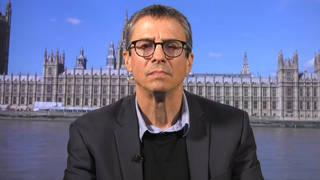
Related
The European Union elections concluded over the weekend, with centrist parties losing dozens of seat while far-right and Green candidates made significant strides. In France, the far-right National Rally party led by Marine Le Pen narrowly beat the centrist alliance led by French President Emmanuel Macron. In Italy, the far-right nationalist League party placed first, winning 34% of the vote. The party is led by Italy’s Deputy Prime Minister Matteo Salvini. While right-wing euroskeptic parties slightly increased their power in the EU assembly, about 75% of voters still backed parties that support Europe. We speak with David Adler, the policy coordinator for the Democracy in Europe Movement, or DiEM25.
Transcript
JUAN GONZÁLEZ: We begin today’s show looking at the European Union elections, which saw centrist parties losing dozens of seats while far-right and Green candidates made significant strides. In France, the far-right National Rally party led by Marine Le Pen narrowly defeated the centrist alliance led by French President Emmanuel Macron. In Britain, the Brexit Party led by Nigel Farage came in first with 31% of the vote. The ruling Tory Party placed fifth. The elections came soon after Prime Minister Theresa May announced her resignation. In Italy, the far-right nationalist League party placed first, winning 34% of the vote. The party is led by Italy’s Deputy Prime Minister Matteo Salvini.
DEPUTY PRIME MINISTER MATTEO SALVINI: [translated] Not only is the League the first party in Italy, but Marine Le Pen is the first party in France. In the U.K., Nigel Farage is the first. So, Italy, France, England, it’s a sign of a Europe that is changing.
AMY GOODMAN: While right-wing euroskeptic parties slightly increased their power in the European Union assembly, about 75% of voters still backed parties that support Europe. Traditional center-left and center-right parties suffered broad defeats, but the Green Party soared in popularity in many nations, especially Germany, where it placed second. Greens also did well in Finland, France and Ireland. The next president of the European Commission will likely be Bas Eickhout of the Dutch Green Party.
BAS EICKHOUT: We have been campaigning on climate action, social justice and democracy. So those three topics will also be at the negotiation table from a Green perspective. And we will make our demands there, and we will make very clear that any new president of the commission needs to come very clear on these topics and deliver change.
AMY GOODMAN: To talk more about the European Parliament elections, we’re joined by three guests. David Adler is policy coordinator for the Democracy in Europe Movement, or DiEM25. He’s joining us from Athens, Greece, where Greek Prime Minister Alexis Tsipras has called for snap elections.
In London, Paul Mason is with us, author, filmmaker, contributing writer at the New Statesman. Mason’s most recent book is titled Clear Bright Future: A Radical Defence of the Human Being.
And in Germany, we’re joined by Luisa Neubauer. She’s a 23-year-old member of the German Green Party. She brought the climate protests to Germany, which Greta Thunberg had initiated in Sweden protesting outside the Swedish parliament.
We welcome you all to Democracy Now! Let’s begin—we will begin right now by talking to David Adler. David Adler is in Athens, Greece. Talk about the significance of the European Parliament—especially, I think, for a U.S. audience, there isn’t an understanding of a transnational governing body—what the European Parliament means, and then what the surge of the Green Party means, and also the surge of nationalist parties, as well, though they didn’t do as well as people feared.
DAVID ADLER: Sure. So, I think it’s crucial to put these European Parliament elections in context. This is the world’s second-largest exercise of democracy after India’s, 400 million voters across 28 countries competing for this European Parliament, where there are 751 MEPs in total. But, you know, the stakes of this are really who can speak for Europe, who has the platform to speak on behalf of Europe, and for which Europe they’re going to speak.
I think one of the main takeaways from this election is that politics in Europe are Europeanizing. For years pundits hailed the rise or the return of the nation-state, and they pointed to the European Union as evidence of that. So we saw Brexit. We saw Frexit, Gerexit, Italexit and so on. In the last three years, almost all these calls have gone silent. And all of these programs, even Marine Le Pen, who called—asked people to call her “Ms. Frexit,” have scrubbed their programs of references to exiting the European Union. And what that means is that—but, you know, we’ve seen a fortification of the European Union on the outside—namely, there’s no more calls for exit—but we’ve seen an intensification of competition for grabbing power from the inside. So, this is what we would call the transnationalization of politics. And there’s real promise here, as well as real perils.
On the promise side, you know, Democracy in Europe Movement, DiEM25, we were born to fight for a transnational politics that didn’t say, “I’m German, against the Greeks,” “I’m Greeks against the Germans, “north against south,” “east against west,” but built a kind of pan-European vision. And, you know, we’re seeing that in the uptick in voter turnout, as you mentioned in the intro, we’re seeing a real investment in this thing called European politics. And that’s fantastic, because there’s a recognition that many of the most important issues of our day—namely, climate change, migration—these issues will not be solved at a nation-state level. That’s why we’re pushing for things like a Green New Deal for Europe, which we hope the new commission can introduce as a way of binding European countries together, building an energy union and transforming the European economy in the process.
Now to the perils. You mentioned the gains made by the far right. And there, too, we’re seeing a kind of transnationalization of the far right. No longer are these people fighting individual fights; they’re banding together, as we would have seen that this rally in Milan, when Salvini, who scored upwards of 30% in the vote, brought all these characters together. They’re doing well to put aside their differences to fight together. And the danger there is that the same pathologies we once associated with the nation-state—an exclusive nationalism, a xenophobia—are just scaling up now and becoming an exclusive Europeanism. So people like Salvini, people like Marine Le Pen, they may not be talking about the greatness of France or Italy in particular, but saying, “I believe in a white, Christian Europe.” So, you know, we’re seeing this big battle over who can speak for Europe and whether that’s going to be an exclusive all-white Europe or much more progressive Europe with climate justice at its heart.
JUAN GONZÁLEZ: Well, but, David Adler, on this issue of the attacks on immigrants and the vision of a white, Christian Europe, what about the fact that the biggest countries are precisely the ones—France, Italy, Britain—that have had this surge of this right-wing vote? And also, aren’t many of the centrist parties, the center-left and center-right parties, increasingly kowtowing to the anti-immigrant fervor across the continent?
DAVID ADLER: Absolutely. And I think there’s a real misunderstanding about what we might call, you know, the nature of the far right. So, in the run-up to the elections, we saw a lot of panic about this, especially in the American press. There was a sense that, you know, Steve Bannon was lurking under the covers, building a kind of transnational movement. And when that failed to materialize, as in it had failed to end up with a sweeping coup in the European Parliament in terms of far-right parties all across Europe, many commentators are now sneering and saying, “Ah, you know, there’s no mandate for the far right.”
But I think this puts the bar for optimism way too low. You know, the goal shouldn’t be to stave off a purge—a surge, rather, in the far right; it should be to guarantee a purge of those parties, to make sure that they have no place in our politics. People are saying, for example, “It’s OK. Nigel Farage, you know, he won about the same votes he won in 2014. Same with Marine Le Pen.” That’s not the point. There’s no healthy politics that permits these far-right parties to even maintain and deepen their grip on these institutions.
And so I think we should be deeply terrified not only that they are still hanging around and capturing even more vote share, but precisely that they’re winning the war of ideas. I mean, you’re exactly right when you say that parties, even left-wing parties, in places like Denmark, in places like France, are sort of developing a consensus around the need to build a fortress around Europe and prevent the entry of migrants. And so, then you have to ask yourself the question: Who needs the far right when the liberals will do their job for them?












Media Options